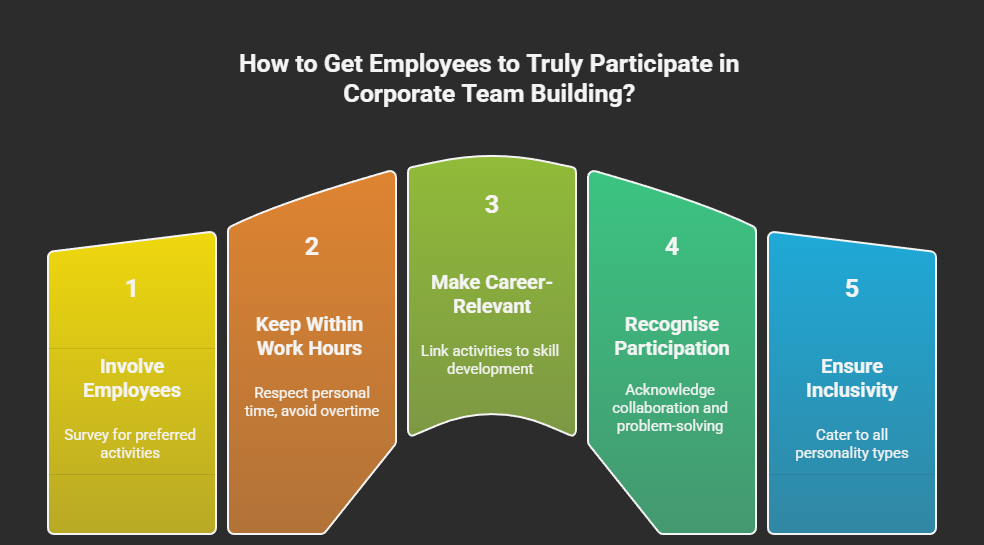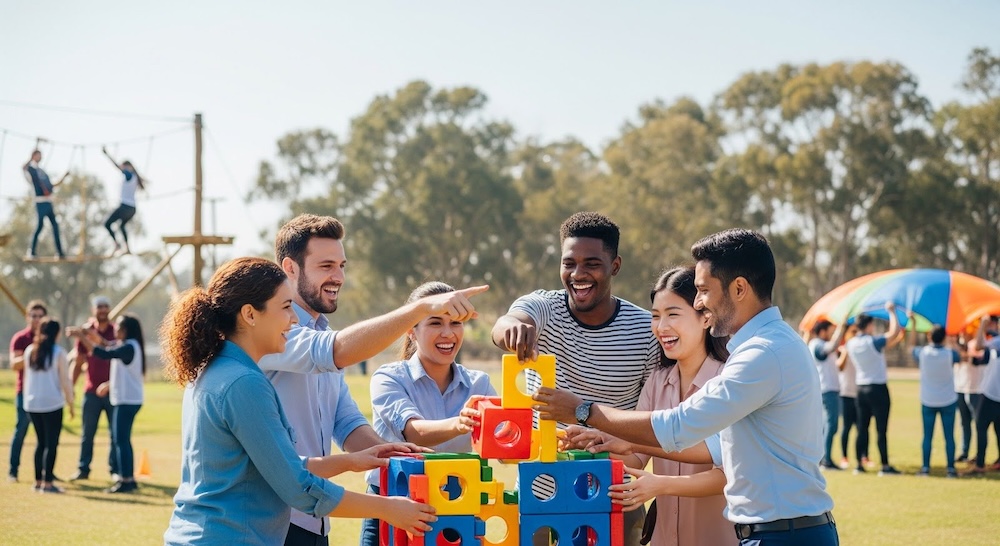Key Takeaways:
- Corporate team building works best when it’s engaging, inclusive, and purpose-driven.
- Outdated “forced fun” activities like paintball or trust falls don’t build genuine teamwork.
- Modern team building connects fun with real workplace skills like communication and collaboration.
- Employee input and during-work scheduling significantly increase participation rates.
- Activities should promote trust, inclusion, and real problem-solving — not just entertainment.
- HR teams can turn team building from a dreaded chore into a key engagement strategy.

Introduction
Let’s be honest: corporate team building often gets a bad reputation.
While it’s meant to unite teams and boost morale, many employees secretly dread it. From awkward icebreakers to competitive games that feel more stressful than fun, the idea of “team bonding” can sometimes backfire.
For HR professionals and management teams, this means one thing: it’s time to rethink what team building truly means.
Modern corporate team building activities aren’t about forcing interaction — they’re about creating inclusive, engaging, and purposeful experiences that genuinely improve communication, collaboration, and trust.
Done right, team building corporate events can energise teams, spark creativity, and even solve real workplace challenges, turning “mandatory fun” into meaningful connection.
What is Corporate Team Building?
 Corporate team building is more than just an afternoon of games or a company retreat. It’s a structured approach to improving communication, trust, and collaboration among employees. At its core, team building is about aligning people with a shared purpose and strengthening how they work together day to day.
Corporate team building is more than just an afternoon of games or a company retreat. It’s a structured approach to improving communication, trust, and collaboration among employees. At its core, team building is about aligning people with a shared purpose and strengthening how they work together day to day.
In the past, team building meant outdoor challenges or “fun days out.” While those can boost morale temporarily, today’s corporate team-building training goes further.
Modern programmes integrate real workplace skills — from communication and emotional intelligence to leadership and problem-solving — so employees can bring what they learn straight back to the office.
When designed intentionally, team-building corporate events contribute to lasting employee engagement, higher performance, and a healthier company culture. It’s about building teams that collaborate better, resolve conflicts faster, and deliver stronger results together.
Why Employees Often Hate Team Building?
Let’s face it — when most employees hear “team building day,” they roll their eyes. And it’s not because they don’t value teamwork — it’s because too many corporate team building activities feel forced, irrelevant, or just plain awkward.
Common complaints include:
- Forced fun: Activities like trust falls or overly scripted icebreakers can make people uncomfortable rather than connected.
- Irrelevant games: Paintball or karaoke may build momentary excitement, but rarely improve real collaboration at work.
- After-hours pressure: When team building cuts into personal time, it feels like an obligation, not a reward.
Even popular discussion forums reveal that employees dislike traditional corporate team-building games because they feel contrived and often benefit extroverts more than introverts.
When team building doesn’t link back to real workplace benefits, participation drops and enthusiasm fades.
To fix this, companies need to reimagine corporate team-building activities in Malaysia as experiences employees want to join. And these should be purposeful, inclusive, and tied to the skills that actually make teams perform better!
What Makes Corporate Team Building Effective?
For corporate team building to truly work, it must go beyond the “fun factor.” The most effective programmes are those that are intentional, inclusive, and directly linked to business goals.
Here’s what separates the best team-building corporate training from the rest:
- Voluntary participation: When people want to be involved, engagement and enthusiasm skyrocket.
- Purposeful design: Each activity should align with real workplace challenges — like collaboration, communication, or problem-solving.
- Inclusivity: Effective team building ensures that introverts and extroverts alike can contribute comfortably.
- Relevance: Activities must connect back to the participants’ roles and the company’s culture, not feel random or forced.
- Measurable outcomes: Modern programmes include reflection sessions, feedback, and even ROI tracking to gauge real impact.
Old-school “trust falls” and “ropes courses” may build temporary excitement, but modern corporate team building ideas focus on skill development, mindset shifts, and cultural alignment.
When done right, team building becomes a catalyst for better communication, stronger trust, and long-term performance improvement.
Corporate Team Building Activities Employees Actually Want
Modern employees crave corporate team-building activities that feel meaningful, not mandatory.
The best programmes strike a balance between learning, collaboration, and genuine enjoyment — not embarrassment or exhaustion.
Here are activities that employees actually look forward to:
- Problem-solving workshops: Interactive challenges that mirror real workplace situations, improving critical thinking and teamwork.
- Collaborative challenges: Group-based projects like escape rooms, design sprints, or innovation labs that encourage creativity and cross-department collaboration.
- Innovation & creativity labs: Hands-on sessions where teams brainstorm ideas, pitch solutions, or prototype new business concepts.
- Hybrid-friendly digital games: Virtual or hybrid corporate team-building games that connect on-site and remote teams through shared goals and interactive play.
- CSR-driven activities: Community-based initiatives such as charity drives or sustainability projects that align with company values while fostering purpose.
Across Malaysia, corporate team building events are shifting away from one-size-fits-all outings to customised, skills-based experiences that make employees feel invested in the outcome.
How to Get Employees to Truly Participate in Corporate Team Building?

Participation is the real challenge, not planning.
Many companies spend time and money on corporate team-building events, only to find half the team disengaged. The key is designing programmes that employees actually want to join.
Here’s how HR teams and managers can make participation natural, not forced:
- Involve employees in the planning: Run quick surveys or polls to understand what types of corporate team-building activities your team genuinely enjoys. When people feel heard, they’re more likely to participate.
- Keep it within work hours: Respect personal time. Avoid after-hours or weekend events unless clearly optional. Team building works best when it’s part of work, not extra work.
- Make it career-relevant: Link each activity to practical outcomes like leadership development, collaboration, creativity, or communication. This transforms fun events into valuable corporate team-building training.
- Recognise participation: Acknowledge teams that show collaboration, creativity, or problem-solving. Recognition boosts engagement and sets the tone for future participation.
- Ensure inclusivity: Choose activities that cater to all personality types — introverts, extroverts, and everyone in between.
When done right, team-building corporate programmes become part of your company culture. These can be something employees look forward to, not avoid. It’s about creating experiences that feel valuable, inclusive, and rewarding.

Thriving Talents’ Approach to Team Building Corporate Training
At Thriving Talents, we believe team building should do more than entertain. It should transform how teams collaborate, communicate, and perform.
Our corporate team building training is designed around three key principles:
- Purpose-driven design: Every activity ties back to real business objectives — whether it’s improving leadership communication, strengthening trust, or breaking departmental silos.
- Customisation over templates: No generic “fun days out.” Each session is tailored to your company culture, team dynamics, and performance goals.
- Lasting impact: We integrate behavioural insights, reflective debriefs, and post-event action plans to ensure the learning sticks.
Our programmes go beyond icebreakers. From problem-solving challenges to cross-generational collaboration workshops, every experience is research-backed, inclusive, and results-focused.
We’ve helped organisations across Malaysia create corporate team-building events that energise employees, align teams, and drive measurable workplace transformation.
Explore our team building and engagement solutions!
Conclusion
Corporate team building doesn’t have to make employees roll their eyes. It can genuinely inspire, connect, and strengthen your workplace culture.
The difference lies in how it’s done. When activities are inclusive, skill-based, and tied to real goals, they stop feeling like forced fun and start becoming powerful moments of engagement and growth.
For HR leaders and managers, the goal isn’t just to organise another outing but to create corporate team-building events that people actually enjoy and remember because they add value to their work lives.
If you’re ready to make team building meaningful again, let’s design something your teams will look forward to — and talk about long after it’s over.
Ready to create team-building experiences your employees will actually enjoy? Let’s plan it together.


